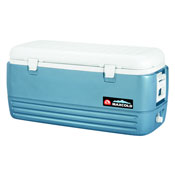Javaslinger
Well-Known Member
- Joined
- May 9, 2017
- Messages
- 121
- Reaction score
- 13
2nd Brew Day in the Books. Went all grain modified BIAB in my 4 gal pot. Pot wasn't quite big enough for full volume so I started with 2.5 gallons with the intention of adding a dunk sparge at Mash Out with another gallon. Was going for a Mexican Mole Sweet Stout by modifying the recipe with the addition of 1lb lactose. Had a few hiccups if anyone would like to comment on them...
http://beerandwinejournal.com/mole-stout-recipe/
1) The acidity of my Mash was a bit low at pH 5.0 rather than 5.2-5.4. I figured it might be due to my low volume so I added about another 1/2 gal in the mash, but it didn't seem to bring up the pH. No idea if this will have much impact. Not sure if there is a way to bring the pH up as most of what I've seen is additions of acid to bring it down.... [I have found out that pH mush be adjusted if taken at mash temps. Seems it will read about 0.3 lower than at RT meaning I may have been spot on!]
2) My koozy for my kettle to maintain the Mash build out of Reflectix was a big bust. It didn't seem to do any better than without so in the end I just bumped the temp periodically throughout the Mash. The result being that instead of a steady 152 I was cycling between 160 and 148 over the course of the 90 min Mash.
3) Gravity after the Mash was much higher than predicted by Beersmith. Final Gravity after boil was 1.10. Quite higher than expected, but I seem to get much more boil off in this kettle than anticipated. I suspect that the addition of lactose is at least partially at fault for bumping the gravity since I didn't reduce the grain bill do compensate.
4) Used Beersmith to calculate water adjustments based on my water report from Ward Labs. My kitchen scale is not good down at the 1-2 gram level... Need to find another way to measure this..
5) Since Russian Imperial Stouts can begin with a OG as high or higher than 1.10, I decided not to dilute the batch to bring the gravity down. Certainly not typical for a milk stout, but perhaps there is such a thing as a Russian Imperial Sweet Stout?? We shall see how the WLP004 Irish Ale Yeast holds up.
6) The first use of my counterflow chiller was a success! Wort went in around 208 and came out the other end at 70. I'm going to need to filter the wort, however, as it clogged with debris toward the end when I begin tipped the kettle.
http://beerandwinejournal.com/mole-stout-recipe/
1) The acidity of my Mash was a bit low at pH 5.0 rather than 5.2-5.4. I figured it might be due to my low volume so I added about another 1/2 gal in the mash, but it didn't seem to bring up the pH. No idea if this will have much impact. Not sure if there is a way to bring the pH up as most of what I've seen is additions of acid to bring it down.... [I have found out that pH mush be adjusted if taken at mash temps. Seems it will read about 0.3 lower than at RT meaning I may have been spot on!]
2) My koozy for my kettle to maintain the Mash build out of Reflectix was a big bust. It didn't seem to do any better than without so in the end I just bumped the temp periodically throughout the Mash. The result being that instead of a steady 152 I was cycling between 160 and 148 over the course of the 90 min Mash.
3) Gravity after the Mash was much higher than predicted by Beersmith. Final Gravity after boil was 1.10. Quite higher than expected, but I seem to get much more boil off in this kettle than anticipated. I suspect that the addition of lactose is at least partially at fault for bumping the gravity since I didn't reduce the grain bill do compensate.
4) Used Beersmith to calculate water adjustments based on my water report from Ward Labs. My kitchen scale is not good down at the 1-2 gram level... Need to find another way to measure this..
5) Since Russian Imperial Stouts can begin with a OG as high or higher than 1.10, I decided not to dilute the batch to bring the gravity down. Certainly not typical for a milk stout, but perhaps there is such a thing as a Russian Imperial Sweet Stout?? We shall see how the WLP004 Irish Ale Yeast holds up.
6) The first use of my counterflow chiller was a success! Wort went in around 208 and came out the other end at 70. I'm going to need to filter the wort, however, as it clogged with debris toward the end when I begin tipped the kettle.


